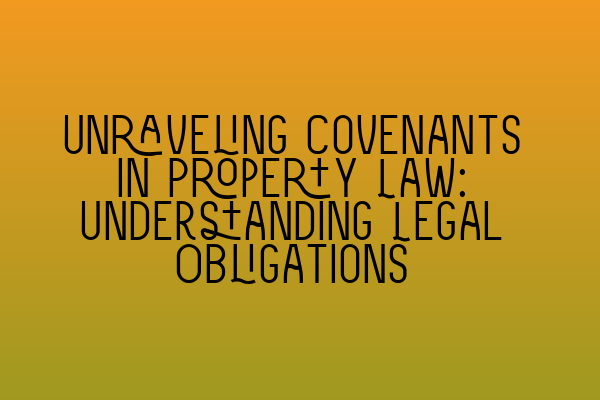Unraveling Covenants in Property Law: Understanding Legal Obligations
As a property owner or someone involved in the real estate industry, it is crucial to familiarize yourself with various legal concepts that impact property ownership and use. One such concept is covenants, which are legal obligations or restrictions that bind the owner of the property. Understanding covenants is essential for protecting your property rights and ensuring compliance with legal requirements. In this blog post, we will unravel the intricacies of covenants in property law and provide you with a comprehensive understanding of their implications.
What are Covenants?
Covenants are legal obligations or restrictions that are typically contained in a deed, lease, or other legal documents governing the use and ownership of real property. These obligations can be imposed by a seller, developer, or previous property owner on the current or future owners of the property.
Types of Covenants
There are different types of covenants that can affect property ownership. Let’s take a closer look at some common ones:
1. Restrictive Covenants: These covenants restrict certain activities or actions that can be performed on the property. For example, a restrictive covenant may prohibit the construction of certain types of structures, the running of a business from the property, or the presence of pets. These covenants aim to maintain the character and quality of a particular area.
2. Positive Covenants: Positive covenants, on the other hand, require the property owner to take certain actions or perform specific tasks. For instance, a positive covenant may require the property owner to contribute to the maintenance of shared facilities or abide by certain architectural guidelines.
3. Personal Covenants: Personal covenants are obligations that are binding only on the parties involved and do not transfer to subsequent owners. These covenants typically arise in contractual arrangements between parties.
4. Running Covenants: Running covenants are obligations that run with the land, meaning they are binding on all future owners of the property. These covenants are usually recorded in the property’s title deed and continue to apply regardless of changes in ownership.
Enforceability of Covenants
Whether or not a covenant is enforceable depends on several factors, including its nature and the legal requirements in your jurisdiction. In general, for a covenant to be enforceable, it must:
– Be in writing and properly recorded
– Touch and concern the land
– Benefit and burden the parties involved
– Be intended to run with the land
Failure to adhere to an enforceable covenant can lead to legal consequences, such as injunctions, damages, or the possibility of a forced sale of the property.
Overcoming Covenants
In some cases, property owners may need to overcome or modify existing covenants to meet their specific needs or objectives. This can be done through various legal mechanisms, such as obtaining a release or variation from the party benefiting from the covenant or seeking a court order to modify or remove the covenant.
However, it is important to note that attempting to modify or remove a covenant can be a complex and time-consuming process. Seeking legal advice from a qualified property solicitor is crucial to ensure compliance with legal requirements and increase the chances of a successful outcome.
Conclusion
Understanding covenants and their implications is vital for anyone involved in property ownership or real estate transactions. By familiarizing yourself with the different types of covenants, their enforceability, and the mechanisms to overcome them, you can protect your property rights and navigate potential legal challenges more effectively.
At SQE Property Law & Land Law, we provide expert legal advice and assistance on all matters related to property law, including covenants. Our team of solicitors has extensive experience in handling complex property transactions and can guide you through the intricate details of property ownership and legal obligations.
If you’re preparing for SQE 1 or SQE 2 exams and looking for practice resources or preparation courses, ensure to check out our related articles:
– SQE 1 Practice Exam Questions
– SQE 1 Practice Mocks FLK1 FLK2
– SQE 2 Preparation Courses
– SQE 1 Preparation Courses
– SRA SQE Exam Dates
Feel free to contact us at SQE Property Law & Land Law for all your property law needs. Our team is dedicated to providing top-notch legal services and assisting you in navigating the complexities of property ownership with ease.
